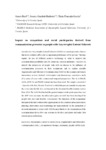Impact on occupations and social participation derived from communication processes in people with amyotrophic lateral sclerosis

Ver/
Use este enlace para citar
http://hdl.handle.net/2183/33199Coleccións
- Investigación (FCS) [1284]
Metadatos
Mostrar o rexistro completo do ítemTítulo
Impact on occupations and social participation derived from communication processes in people with amyotrophic lateral sclerosisData
2023-05-23Cita bibliográfica
Roel Porta A, Garabal-Barbeira J, Pousada García T. Impact on occupations and social participation derived from communication processes in people with amyotrophic lateral sclerosis. Occup Ther Bull. 2023;79(2):147-154.
Resumo
[Abstract] Introduction: Amyotrophic Lateral Sclerosis (ALS) is a neurodegenerative disease that in its evolution affects the occupational performance of the person. This may require the use of different assistive technology in order to improve the communication possibilities and, by extension, personal autonomy. Objective: to identify the perspective of people with ALS in relation to the influence of communication processes in their occupations and to explore possible Augmentative and Alternative Communication (AAC) in the occupational therapy intervention process. Methods: A descriptive and observational quantitative study of a series of cases with a transversal temporal perspective. The ALS-FRS-R, ACIS, ATD PA and PIADS instruments have been used. The sample consisted of 10 people with ALS. Results: The level to which the person normally incorporates the device into his life does not depend on the functional health situation derived from ALS. The AAC that has had the greatest impact on the participants has been the APP voice assistant. An informative guide on AAC has been developed for people with ALS and families. Conclusions: The functions of the occupational therapist in the intervention with support products for communication (assessment, planning, intervention and monitoring) are transcendental for the promotion of personal autonomy of people with ALS because thanks to the incorporation of the communication device they can continue to develop, participate and make their own decisions in freedom.
Palabras chave
Amyotrophic Lateral Sclerosis (ALS)
Augmentative and Alternative Communication (AAC)
Occupational therapy
Autonomy
Quality of life (QoL)
Augmentative and Alternative Communication (AAC)
Occupational therapy
Autonomy
Quality of life (QoL)
Versión do editor
ISSN
1447-3828





